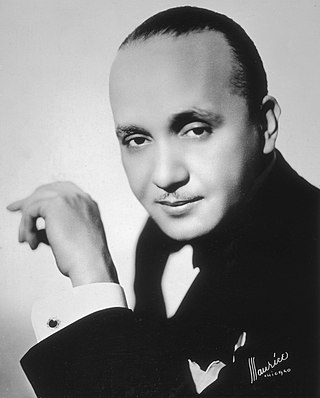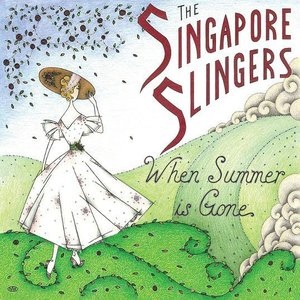
Brave Combo is a polka fusion band based in Denton, Texas. Founded in 1979 by guitarist/keyboardist/accordionist Carl Finch, they have been a prominent fixture in the Texas music scene for more than thirty-five years. Their music, both originals and covers, incorporates a number of dance styles, mostly polka, but also some Latin American and Caribbean styles like norteño, salsa, rumba, cha-cha-cha, choro, samba, two-step, cumbia, charanga, merengue, ska, etc, all performed with a rock/worldbeat energy.

James W. Sturr Jr. is an American polka musician, trumpeter, clarinetist, saxophonist and leader of Jimmy Sturr & His Orchestra. Media outlets have often dubbed him the "King of Polka," with his recordings having won 18 out of the 24 Grammy Awards given for Best Polka Album. Sturr's orchestra is on the Top Ten List of the All-Time Grammy Awards, and has acquired more Grammy nominations than anyone in the history of musical polka awards.

A big band or jazz orchestra is a type of musical ensemble of jazz music that usually consists of ten or more musicians with four sections: saxophones, trumpets, trombones, and a rhythm section. Big bands originated during the early 1910s and dominated jazz in the early 1940s when swing was most popular. The term "big band" is also used to describe a genre of music, although this was not the only style of music played by big bands.

James Fletcher Hamilton Henderson was an American pianist, bandleader, arranger and composer, important in the development of big band jazz and swing music. He was one of the most prolific black musical arrangers and, along with Duke Ellington, is considered one of the most influential arrangers and bandleaders in jazz history. Henderson's influence was vast. He helped bridge the gap between the Dixieland and the swing eras. He was often known as "Smack" Henderson.

Claude Thornhill was an American pianist, arranger, composer, and bandleader. He composed the jazz and pop standards "Snowfall" and "I Wish I Had You".
The swing era was the period (1933–1947) when big band swing music was the most popular music in the United States, especially for teenagers. Though this was its most popular period, the music had actually been around since the late 1920s and early 1930s, being played by black bands led by such artists as Duke Ellington, Jimmie Lunceford, Bennie Moten, Cab Calloway, Earl Hines, and Fletcher Henderson, and white bands from the 1920s led by the likes of Jean Goldkette, Russ Morgan and Isham Jones. An early milestone in the era was from "the King of Swing" Benny Goodman's performance at the Palomar Ballroom in Los Angeles on August 21, 1935, bringing the music to the rest of the country. The 1930s also became the era of other great soloists: the tenor saxophonists Coleman Hawkins, Ben Webster and Lester Young; the alto saxophonists Benny Carter and Johnny Hodges; the drummers Chick Webb, Gene Krupa, Jo Jones and Sid Catlett; the pianists Fats Waller and Teddy Wilson; the trumpeters Louis Armstrong, Roy Eldridge, Bunny Berigan, and Rex Stewart.

Myron Floren was an American musician best known as the accordionist on The Lawrence Welk Show between 1950 and 1980. Floren came to prominence primarily from his regular appearances on the weekly television series in which Lawrence Welk dubbed him as "the happy Norwegian," which was also attributed to Peter Friello.
Slovenian-style polka is an American style of polka in the Slovenian tradition. It is usually associated with Cleveland and other Midwestern cities.
Banda is a subgenre of regional Mexican music and type of ensemble in which wind and percussion instruments are performed.
James Brian Pekol is an American musician originally from Wausau, Wisconsin.
Orchestral jazz or symphonic jazz is a form of jazz that developed in New York City in the 1920s. Early innovators of the genre, such as Fletcher Henderson and Duke Ellington, include some of the most highly regarded musicians, composers, and arrangers in all of jazz history. The fusion of jazz's rhythmic and instrumental characteristics with the scale and structure of an orchestra, made orchestral jazz distinct from the musical genres that preceded its emergence. Its development contributed both to the popularization of jazz, as well as the critical legitimization of jazz as an art form.
The accordion is in a wide variety of musical genres, mainly in traditional and popular music. In some regions, such as in Europe and North America, it has become mainly restricted to traditional, folk and ethnic music. Nonetheless, the button accordion (melodeon) and the piano accordion are widely taught and played in Ireland, and have remained a steady fixture within Irish traditional music, both in Ireland and abroad, particularly in the United States and Great Britain. Numerous virtuoso Irish accordion players have recorded many albums over the past century or so; the earliest Irish music records were made in the 1920s, in New York City, by fiddler and Sligo immigrant Michael Coleman, widely considered to have paved the way for other traditional musicians to record themselves. Accordions are also played within other Celtic styles, as well as in English traditional music, American traditional music, polka, Galician folk music, and Eastern European folk music.

Adolph John Hofner was an American Western swing bandleader and singer.
Roman 'Romy' Louis Gosz was a popular and commercially successful polka musician in the upper Midwest. Gosz's music featured the Bohemian brass style and appealed to the many ethnic groups found throughout the region.

Bernardus Johannes Berkhout is a family doctor, best known as a jazz clarinetist.

The Singapore Slingers are an American 18-member orchestra based in Dallas, Texas that specializes in performing pre-swing American dance music, with a particular focus on popular songs of the 1920s and early 1930s. They have been called the "coolest, quirkiest, retro jazz group" in Dallas by the local press. They are the only group of their kind in Dallas, with a repertoire that regularly features fox trots, waltzes, marches, one-steps, two-steps, rags, tangos, and rumbas. The band was formed in late 2007 by Dallas native Matt Tolentino, and continues under his direction, normally consisting of four reeds, three brass, five rhythm players, and a string section including three violins, a viola, a cello, and a string bass. The Singapore Slingers were nominated in the category "Best Jazz Act" for the 2011 Dallas Observer Music Awards, and were named Best Pre-Swing Jazz Orchestra by the Dallas Observer in 2011.

Tuba Skinny is a traditional jazz street band based in New Orleans, Louisiana. The band's instrumentation includes cornet, clarinet, trombone, tuba, tenor banjo, guitar, frottoir, and vocals. The ensemble draws its inspiration from the early jazz, ragtime, and blues music of the 1920s and 1930s. The group began as an itinerant busking band and has performed around the world, including at music festivals in Mexico, Sweden, Australia, Italy, France, Switzerland, and Spain.

Larry Chesky, born Lawrence J. Ciszewski, was an American accordion player, Polka band leader, inductee in the International Polka Hall of Fame, and manager of the Rex Records label.
Sam Musiker (1916–1964) was an American clarinetist and saxophonist whose career spanned both jazz and klezmer music. He is best known as the musical director of the album Tanz which also featured his brother Ray Musiker and his father-in-law Dave Tarras.

Sidewalk Meeting is an album by saxophonist Ted Nash which was recorded in 2000 and released on the Arabesque label the following year.












